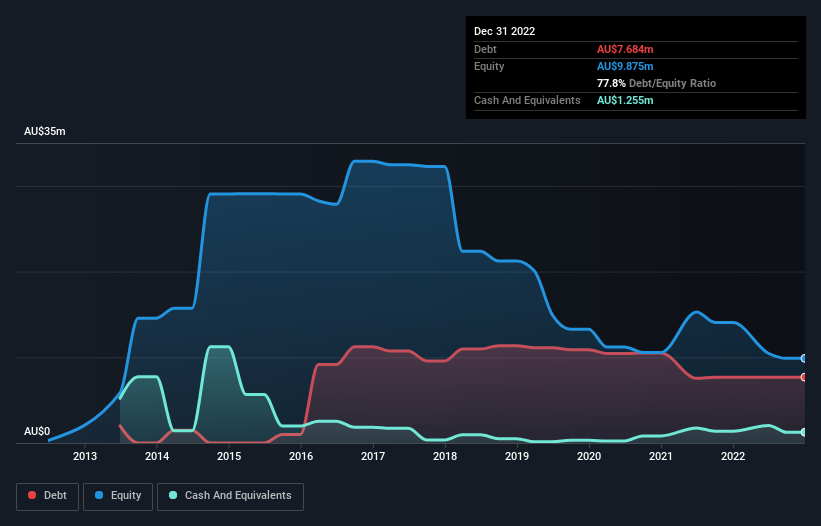Some say volatility, rather than debt, is the best way to think about risk as an investor, but Warren Buffett famously said that 'Volatility is far from synonymous with risk.' When we think about how risky a company is, we always like to look at its use of debt, since debt overload can lead to ruin. We note that xReality Group Limited (ASX:XRG) does have debt on its balance sheet. But is this debt a concern to shareholders?
When Is Debt Dangerous?
Generally speaking, debt only becomes a real problem when a company can't easily pay it off, either by raising capital or with its own cash flow. Part and parcel of capitalism is the process of 'creative destruction' where failed businesses are mercilessly liquidated by their bankers. However, a more common (but still painful) scenario is that it has to raise new equity capital at a low price, thus permanently diluting shareholders. Having said that, the most common situation is where a company manages its debt reasonably well - and to its own advantage. The first step when considering a company's debt levels is to consider its cash and debt together.
See our latest analysis for xReality Group
What Is xReality Group's Net Debt?
As you can see below, xReality Group had AU$7.68m of debt, at December 2022, which is about the same as the year before. You can click the chart for greater detail. However, because it has a cash reserve of AU$1.25m, its net debt is less, at about AU$6.43m.

How Strong Is xReality Group's Balance Sheet?
Zooming in on the latest balance sheet data, we can see that xReality Group had liabilities of AU$5.65m due within 12 months and liabilities of AU$22.1m due beyond that. On the other hand, it had cash of AU$1.25m and AU$1.29m worth of receivables due within a year. So its liabilities total AU$25.2m more than the combination of its cash and short-term receivables.
When you consider that this deficiency exceeds the company's AU$21.4m market capitalization, you might well be inclined to review the balance sheet intently. In the scenario where the company had to clean up its balance sheet quickly, it seems likely shareholders would suffer extensive dilution. When analysing debt levels, the balance sheet is the obvious place to start. But it is xReality Group's earnings that will influence how the balance sheet holds up in the future. So if you're keen to discover more about its earnings, it might be worth checking out this graph of its long term earnings trend.
In the last year xReality Group wasn't profitable at an EBIT level, but managed to grow its revenue by 48%, to AU$9.1m. With any luck the company will be able to grow its way to profitability.
Caveat Emptor
Despite the top line growth, xReality Group still had an earnings before interest and tax (EBIT) loss over the last year. Its EBIT loss was a whopping AU$2.1m. When we look at that alongside the significant liabilities, we're not particularly confident about the company. We'd want to see some strong near-term improvements before getting too interested in the stock. For example, we would not want to see a repeat of last year's loss of AU$6.6m. And until that time we think this is a risky stock. When analysing debt levels, the balance sheet is the obvious place to start. But ultimately, every company can contain risks that exist outside of the balance sheet. For example - xReality Group has 2 warning signs we think you should be aware of.
If, after all that, you're more interested in a fast growing company with a rock-solid balance sheet, then check out our list of net cash growth stocks without delay.
Valuation is complex, but we're here to simplify it.
Discover if xReality Group might be undervalued or overvalued with our detailed analysis, featuring fair value estimates, potential risks, dividends, insider trades, and its financial condition.
Access Free AnalysisHave feedback on this article? Concerned about the content? Get in touch with us directly. Alternatively, email editorial-team (at) simplywallst.com.
This article by Simply Wall St is general in nature. We provide commentary based on historical data and analyst forecasts only using an unbiased methodology and our articles are not intended to be financial advice. It does not constitute a recommendation to buy or sell any stock, and does not take account of your objectives, or your financial situation. We aim to bring you long-term focused analysis driven by fundamental data. Note that our analysis may not factor in the latest price-sensitive company announcements or qualitative material. Simply Wall St has no position in any stocks mentioned.
About ASX:XRG
xReality Group
Develops and operates physical and digital simulations in the Asia Pacific and the United States.
Adequate balance sheet with slight risk.
Market Insights
Community Narratives




